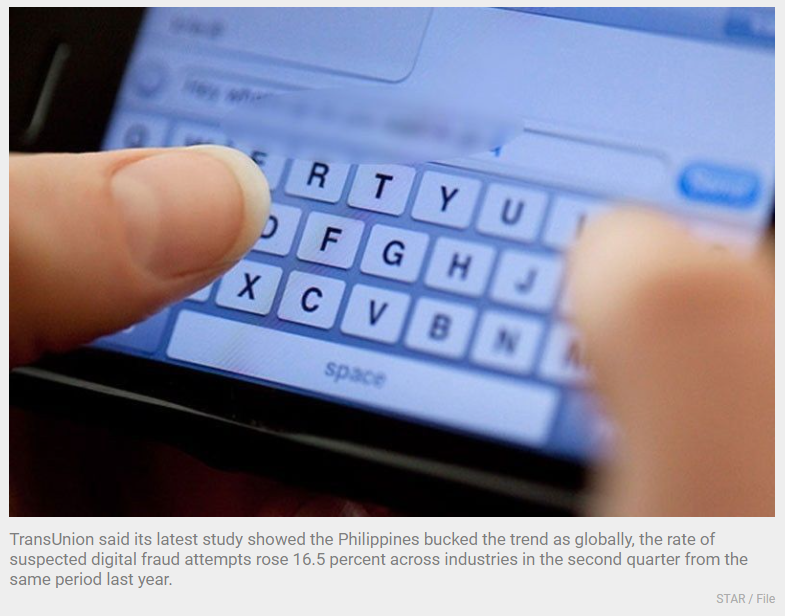Digital fraud attempts from Philippines down 59%
MANILA, Philippines — Suspected digital fraud attempts originating from the Philippines dropped by 59 percent in the second quarter from a year ago, but businesses need to remain vigilant and take steps to build consumer confidence in transactions, information and insights firm TransUnion said.
TransUnion said its latest study showed the Philippines bucked the trend as globally, the rate of suspected digital fraud attempts rose 16.5 percent across industries in the second quarter from the same period last year.
“Among all the markets that our research covered, the Philippines recorded the second biggest decline in the rate of suspected digital fraud originating from that country, next only to Brazil. It is possible fraudsters have recognized the fraud controls our customers have after experiencing them first-hand and have gone elsewhere for the time being. However, constant vigilance is still warranted as we’ll likely see them again in industries where transactions are increasing,” TransUnion Philippines president and chief executive officer Pia Arellano said.
TransUnion is tracking digital fraud attempts being reported by businesses from various industries.
By industry, TransUnion said the largest declines in suspected digital fraud coming from the Philippines were seen in telecommunications (-98.7 percent), logistics (-71.1 percent), and financial services (-61.3 percent).
TransUnion said these industries were heavily affected during previous periods.
Registering the largest increases meanwhile, are the travel and leisure (198.5 percent), communities (163.8 percent) and gaming (51.4 percent).
In the travel and leisure industry, the top type of fraud is credit card fraud which takes place when a fake or stolen credit card is used for a purchase.
As for communities like online dating or forums, profile misrepresentation or the use of inaccurate information or photos, is the top fraud type.
When it comes to the global gaming industry, gold farming or the sale of in-game assets or currency for real world cash, was identified as the top type of fraud.
TransUnion also said one in three consumers globally have been targeted by a digital fraud scheme related to COVID-19 during the second quarter of this year.
In the same period, phishing was the number one type of COVID digital related fraud that affected consumers.
Arellano said the numbers show businesses need to give customers the confidence to transact with them.
“As fraudsters continue to target consumers, it’s incumbent on businesses to do all that they can to ensure their customers have an appropriate level of security to trust their transaction is safe, all while having a friction-right experience to avoid shopping cart abandonment,” she said.
Source: https://www.philstar.com/business/2021/08/26/2122604/digital-fraud-attempts-philippines-down-59


 Thailand
Thailand




